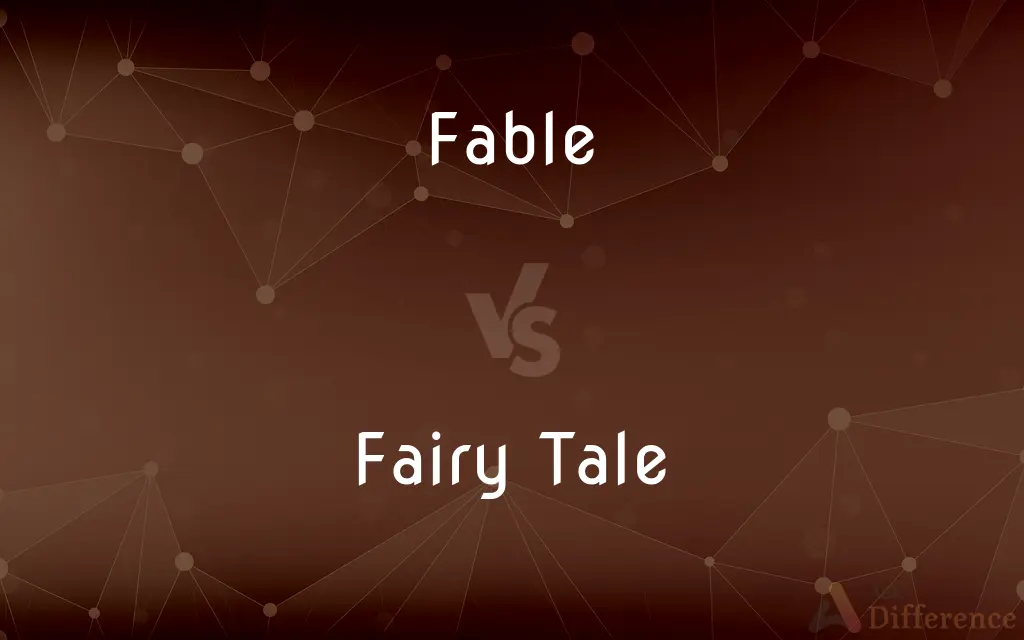Fable vs. Fairy Tale — What's the Difference?
By Tayyaba Rehman — Published on January 7, 2024
A fable is a short story conveying a moral lesson, often featuring animals. A fairy tale is a fantastical story involving magic and mythical creatures, often with a happy ending.

Difference Between Fable and Fairy Tale
Table of Contents
ADVERTISEMENT
Key Differences
Fables are succinct stories that convey moral lessons to its readers or listeners. Often, these stories will use animals as characters who exhibit human-like behaviors, emphasizing the lessons to be learned. In contrast, a fairy tale takes its audience into a world of fantasy, laden with magical elements, mythical creatures, and enchanting settings.
The essence of a fable is the moral it imparts. After reading or hearing a fable, one can typically pinpoint the lesson or ethical teaching it aims to share. Fairy tales, while they can also teach morals, are more centered on the story's adventure, the challenges faced by protagonists, and the magic that intertwines with the narrative.
One notable difference between a fable and a fairy tale is their respective origins. Fables have ancient roots, with many traced back to storytellers like Aesop. These tales were used as tools for teaching values and proper behavior. Fairy tales, on the other hand, often have origins in oral tradition, passed down through generations before being penned by authors like the Brothers Grimm or Hans Christian Andersen.
In summary, while both fables and fairy tales enchant readers with their narratives, fables are didactic stories primarily designed to teach, often through animals. Fairy tales whisk readers away into magical worlds, brimming with enchantment, challenges, and often, happy conclusions.
Comparison Chart
Purpose
To teach a moral lesson.
To entertain with magical narratives.
ADVERTISEMENT
Characters
Often animals with human traits.
Magical beings, royalty, mythical creatures.
Origin
Ancient stories (e.g., Aesop's fables).
Oral traditions, later penned by authors.
Length
Typically short.
Can vary from short to long.
Element of Magic
Rarely present.
Commonly features magic and enchantment.
Compare with Definitions
Fable
Conveys teachings about human behavior.
The fable warns against the dangers of arrogance.
Fairy Tale
A story set in an enchanted world with magical elements.
Cinderella is a fairy tale about a girl and a magical slipper.
Fable
Often features animals as main characters.
In the fable, the fox tries to reach the high grapes.
Fairy Tale
Often features heroes, villains, and magical creatures.
The fairy tale tells of a dragon and a brave knight.
Fable
Typically ends with a stated moral.
The fable concluded with Slow and steady wins the race.
Fairy Tale
Leads to a typically happy or hopeful ending.
In the fairy tale, the prince awakens Snow White with a kiss.
Fable
A usually short narrative making an edifying or cautionary point and often employing as characters animals that speak and act like humans.
Fairy Tale
Conveys a narrative more than a direct moral.
The fairy tale revolves around a princess under a sleeping curse.
Fable
A story about legendary persons and exploits.
Fairy Tale
Rooted in age-old oral traditions.
The fairy tale has been told for centuries across different cultures.
Fable
A falsehood; a lie.
Fairy Tale
Of or relating to a fairy tale.
Fable
To recount as if true.
Fairy Tale
Likened to a fairy tale
A fairy-tale romance that preceded the royal wedding.
Fable
To compose fables.
Fairy Tale
Of the nature of a fairy tale; as if from a fairy tale.
A fairy-tale romance
Fable
A fictitious narrative intended to enforce some useful truth or precept, usually with animals, etc. as characters; an apologue. Prototypically, Aesop's Fables.
Fable
Any story told to excite wonder; common talk; the theme of talk.
Fable
Fiction; untruth; falsehood.
Fable
The plot, story, or connected series of events forming the subject of an epic or dramatic poem.
Fable
To compose fables; hence, to write or speak fiction; to write or utter what is not true.
Fable
To make up; to devise, and speak of, as true or real; to tell of falsely; to recount in the form of a fable.
Fable
A Feigned story or tale, intended to instruct or amuse; a fictitious narration intended to enforce some useful truth or precept; an apologue. See the Note under Apologue.
Jotham's fable of the trees is the oldest extant.
Fable
The plot, story, or connected series of events, forming the subject of an epic or dramatic poem.
The moral is the first business of the poet; this being formed, he contrives such a design or fable as may be most suitable to the moral.
Fable
Any story told to excite wonder; common talk; the theme of talk.
We grewThe fable of the city where we dwelt.
Fable
Fiction; untruth; falsehood.
It would look like a fable to report that this gentleman gives away a great fortune by secret methods.
Fable
To compose fables; hence, to write or speak fiction ; to write or utter what is not true.
Vain now the tales which fabling poets tell.
He fables, yet speaks truth.
Fable
To feign; to invent; to devise, and speak of, as true or real; to tell of falsely.
The hell thou fablest.
Fable
A deliberately false or improbable account
Fable
A short moral story (often with animal characters)
Fable
A story about mythical or supernatural beings or events
Fable
A brief story illustrating a moral lesson.
The tortoise and the hare is a fable about patience.
Fable
Highlights consequences of certain actions.
In the fable, the ant prepares for winter while the grasshopper does not.
Common Curiosities
Who is a famous fable writer?
Aesop is a well-known ancient fable writer.
What's the main purpose of a fable?
A fable primarily aims to teach a moral lesson.
What defines a fairy tale?
A fairy tale is a fantastical story with magic, heroes, and often, a happy ending.
Do fables always have animal characters?
While many fables feature animals, it's not a strict requirement.
Do fairy tales always have happy endings?
While many do, not all fairy tales end happily.
Can a fairy tale teach a lesson?
Yes, while primary for entertainment, fairy tales can also impart morals.
Are fairy tales true stories?
No, fairy tales are fictional and set in magical worlds.
Who are some famous fairy tale authors?
Brothers Grimm and Hans Christian Andersen are renowned fairy tale authors.
Do fairy tales originate from real events?
While influenced by cultural norms and issues, fairy tales are largely fictional.
Is a moral always stated at the end of a fable?
Often, but not always. The lesson can be inferred from the story.
Are all fables short stories?
Fables are typically brief, but their length can vary.
Is the element of magic common in fables?
Magic is rare in fables compared to fairy tales.
Are fairy tales only for children?
While popular with children, fairy tales can be enjoyed by all ages.
Can humans be characters in fables?
Yes, while animals are common, humans can also feature in fables.
Do fables belong to specific cultures?
While some fables are culture-specific, many have universal themes and morals.
Share Your Discovery

Previous Comparison
Trade-Off vs. Opportunity Cost
Next Comparison
Bootstrap vs. CSSAuthor Spotlight
Written by
Tayyaba RehmanTayyaba Rehman is a distinguished writer, currently serving as a primary contributor to askdifference.com. As a researcher in semantics and etymology, Tayyaba's passion for the complexity of languages and their distinctions has found a perfect home on the platform. Tayyaba delves into the intricacies of language, distinguishing between commonly confused words and phrases, thereby providing clarity for readers worldwide.













































